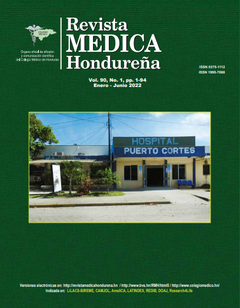Acceptability of the COVID-19 vaccine in students of a public university in Honduras
DOI:
https://doi.org/10.5377/rmh.v90i1.14396Keywords:
COVID-19 Pandemic, COVID-19 Vaccines, HondurasAbstract
Background: The COVID-19 pandemic continues reporting cases and deaths globally and nationally. The COVID-19 vaccine has managed to contain the spread of the disease; however, it is not yet fully accepted. Objective: To determine the level of knowledge, attitudes, and acceptability of the vaccine against COVID-19 and associated factors, in students of the Universidad Nacional Autonoma of Honduras (UNAH) in the year 2021. Methods: Observational, cross-sectional, descriptive study with analytical component. The study population was UNAH students. Results: A total of 1,417 students participated, of which 52.3% (741) were not vaccinated against COVID-19. It was found that 93.5% (693/741) would agree to have the vaccine and 6.5% (48/741) would not agree to have it. A multiple binary logistic regression was carried out, reporting that the age group 40 to 44 years old would have the greater possibility of non-aceptability of the vaccine (OR=17, 95% CI 2.462-120.661; p=0.004). Regarding psychosocial factors, it was found that the subjective norm and inadequate behavioral control would lead to greater possibility of non-acceptance of the vaccine. (OR=11.4, 95% CI 3.605-36.664; p=0.000) and (OR=4.6, 95% CI 1.678-12.281; p= 0.003), respectively. Finally, the social attitude and the perception of inadequate risk would imply no accepting the vaccine (OR=13, 95% CI 5.683-30.322; p=0.000) and (OR=6, 95% CI 2.189-15.159; p=0.000), respectively. Discussion: The inadequate qualification of the psychosocial factors, makes us think that it is probable that the students who did not accept to be vaccinated, due to a direct influence on them.
Downloads
870
Downloads
Published
How to Cite
Issue
Section
License
Copyright (c) 2022 EL AUTOR

This work is licensed under a Creative Commons Attribution 4.0 International License.




